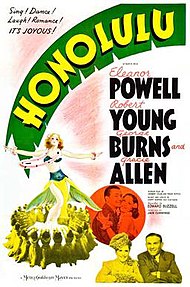Honolulu (film)
| Honolulu | |
|---|---|

Film poster
|
|
| Directed by | Edward Buzzell |
| Produced by | Jack Cummings |
| Written by | Herbert Fields Frank Partos Harry Ruskin (uncredited) |
| Starring |
Eleanor Powell Robert Young George Burns Gracie Allen |
| Music by |
Georgie Stoll Franz Waxman |
| Cinematography | Ray June |
| Edited by | Conrad A. Nervig |
| Distributed by | Metro-Goldwyn-Mayer |
|
Release date
|
|
|
Running time
|
102 minutes |
| Country | United States |
| Language | English |
Honolulu is an American musical film that was released by Metro-Goldwyn-Mayer in 1939. The film stars dancer Eleanor Powell and Robert Young, and was directed by Edward Buzzell. Also appearing in the film are George Burns, Gracie Allen, Eddie "Rochester" Anderson, and Rita Johnson.
Inspired by stories about doppelgängers and identical twins such as The Prince and the Pauper, Honolulu features Young in a dual role as Brooks Mason—a top movie star—and as Hawaiʻi-based businessman George Smith. Mason is tired of being in the public eye, so when he discovers that Smith is close enough to be his twin, he arranges to switch places with Smith temporarily. When Mason steps into Smith's life, he finds himself in a tug-of-war between Smith's fiancée, and a dancer named Dorothy March (Powell), with whom he has fallen in love. Meanwhile, Smith discovers that being a famous movie star is not all that it is made out to be.
Eleanor Powell's dance routines were given a mostly Hawaiian flavor. One of her routines was performed in black face in tribute to Powell's idol, Bill 'Bojangles' Robinson. The comedy of Burns and Allen is also featured, although the two actors work separately for much of the movie, their characters only meeting in the final minutes. This was George Burns' last film appearance for 37 years until his Oscar-winning performance in The Sunshine Boys in 1975. The film is also notable for offering a somewhat rare cinematic look at pre-World War II Honolulu.
There is a notable musical sequence featuring Gracie Allen, accompanied by musicians made to look like the Marx Brothers (including two Grouchos), while several actors in the audience are costumed to look like such famous actors as Clark Gable, W.C. Fields and Oliver Hardy.
...
Wikipedia
